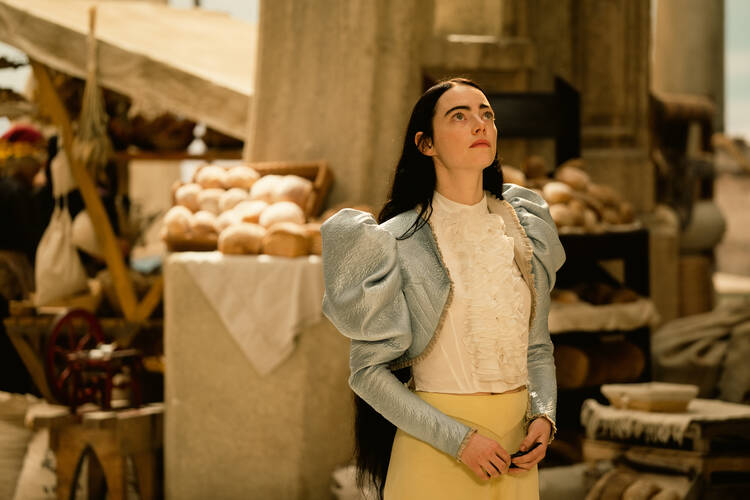Wondrous is a term that at one time might easily have applied to films as diverse as “The Wizard of Oz,” “Modern Times” and “Lawrence of Arabia,” but it has fallen off our list of movie adjectives, largely due to tech pollution: When computer-generated imagery can make everything possible, nothing is astounding. And when the technology is used to recycle and exaggerate old ideas rather than create anew, what do you get? Is that a yawn?
We never yawn in our dreams, or during the provocative hallucinations of director Yorgos Lanthimos (“The Favourite”), whose astounding “Poor Things,” the movie of the year, is a fantastical, steampunk-appointed, futuristic-retro-nostalgic gothic horror social science comedy teeming with visual ideas, jolts to the adrenal gland, and a performance by Emma Stone so singular it may end up residing in the history of cinema alongside those of Louise Brooks (“Pandora’s Box”) and Maria Falconetti (“The Passion of Joan of Arc”).
We never yawn in our dreams, or during the provocative hallucinations of director Yorgos Lanthimos, whose astounding “Poor Things” is the movie of the year.
Those were silent stars. Stone is decidedly not. The verbiage of her character, Bella Baxter, is torrential, stripped of decorum, generated by an awe with the world and ultimately shame-making: If only we could all be as disarmingly honest as Bella, whose frank naïvete makes us realize how casually we lubricate our social discourse with lies, and how refreshing it would be to see the world anew, without counterfeit compliments and camouflage.
But Bella has an advantage: She is a creation. Isn’t she? Hobbling about on infant’s legs, regarding everything with, yes, wonderment (and the occasional Karloffian grunt), Bella presents the viewer with an immediate mystery: What—not who—is this rude, charming manifestation? It would probably be a spoiler to explain exactly how she is wrought, but the opening moment of the film finds a woman (also Stone) teetering at the brink of a perilous cliff, overlooking an English sea (or a Scottish one; written by Tony McNamara, the film is based on the 1992 book by Scots novelist Alasdair Gray). She has a look of suicidal resignation in her eyes.
But here she is later, tottering around the manorial home/surgical theater of Godwin Baxter, whose face looks like a badly assembled jigsaw puzzle and whom Bella calls “God.” Mary Shelley, whose Frankenstein was on Gray’s mind, was fathered by William Godwin, and that may ease some readers’ minds. Or not: The Godwin of Lanthimos is omniscient, inadvertently hilarious and portrayed by Willem Dafoe with a mix of undistilled reason and unmistakable madness. He loves Bella—who doesn’t?—but he takes a clinical view of her progress as his monster. “Her mental age and her body are not quite synchronized,” he says. Hmmm.
There are concepts, myths and ideas at work as disarming as Godwin’s pig-chicken (head of the former, back end of the latter), which struts around the house. The carriage upon which Bella and company ride is not quite horseless; half a horse is attached to a steam engine. Godwin’s casual familiarity with making decoupage out of biological parts is rooted in his childhood: As is revealed in bits and pieces, “God” was reduced to bits and pieces himself by his own mad-scientist father, whom Godwin defends without going into detail (the hints are horrifying enough). But Bella is a success, her encounter with the world a series of surprises and opportunities for corruption, even if she hardly sees it that way. She is Adam, in a sense, the product of a modern Prometheus, who will drive men wild. Which is both the funniest and pointed aspect of her picaresque tale.
Needing someone to chart Bella’s progress as she develops aptitudes and appetites, Godwin enlists one of his students, Max McCandles (Ramy Youssef), who falls in love with her—again, who doesn’t?—and Godwin proposes they wed. Alas, the lawyer: Examining the marriage contract—which forbids Bella and Max from ever leaving Godwin’s house—Duncan Wedderburn (Mark Ruffalo) is intrigued. Who can this precious woman be who inspires such possessiveness? Duncan is a classic cad and spirits Bella away, though hardly against her will: Bella’s rationale is that she must taste all of life’s pleasures— including the “furious jumping” in which she engages, at length, with Duncan (much to Max’s despair)—and then return and marry Max.
There is much more to her journey, but as a pilgrim, she is our avatar into the neglected wonders of a divinely conjured world, the astounding things we take for granted, and the impulses we suppress. “I must go punch that baby,” she says abruptly, arising from her table in a Lisbon restaurant, intending to squelch a squalling infant; Duncan manages to stop her. “Hello, interesting older lady. I must touch your hair,” she says to Martha (Hanna Schygulla; hello, Fassbinder fans), whom she befriends aboard the cruise ship where Duncan has taken her, precisely to avoid other people. Bella has outgrown him—as we knew, and hoped, she would. No one, however, will ever outgrow Bella.
“Poor Things” is in theaters Dec. 8.








